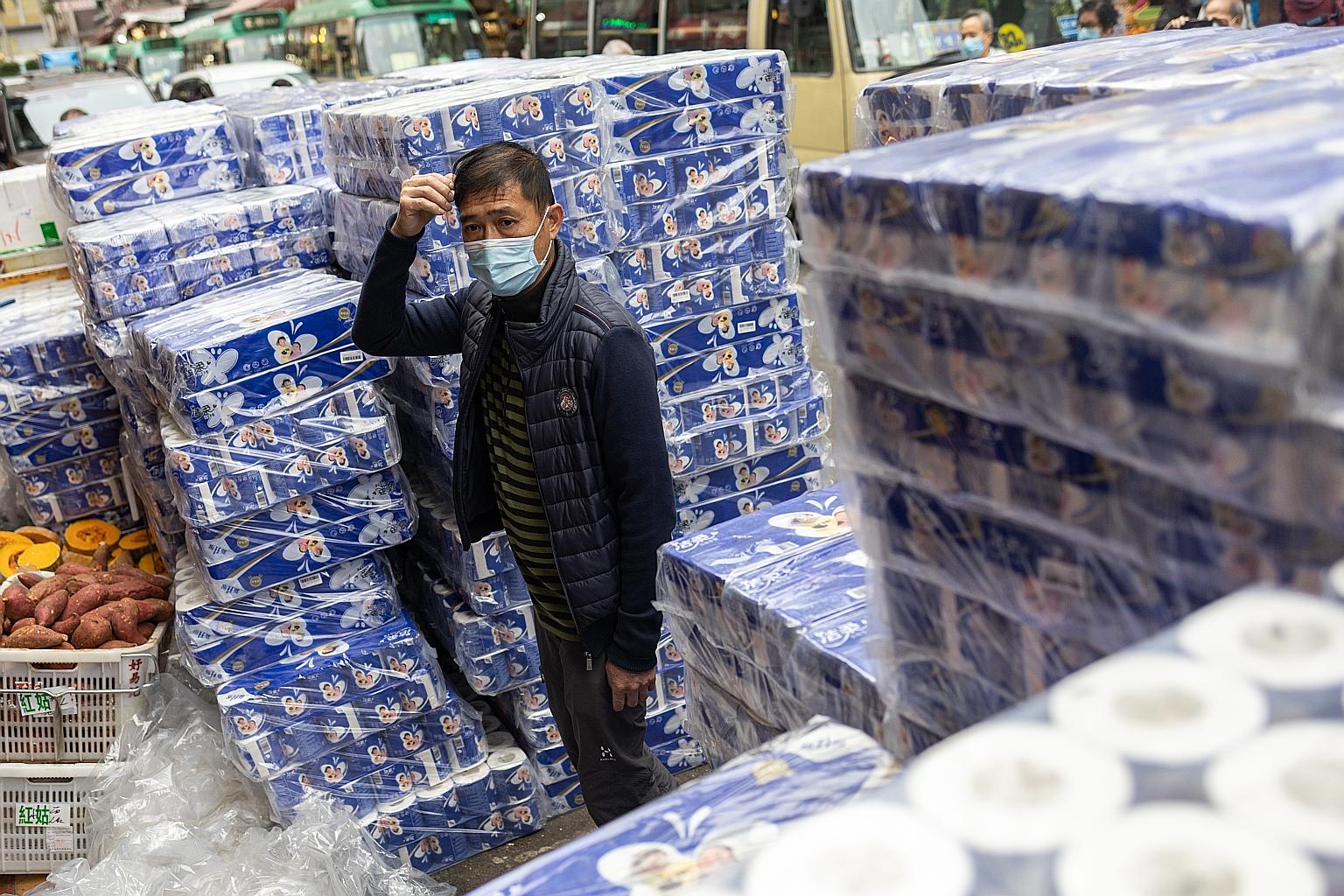Coronavirus: Hong Kong residents slam government's poor crisis response
The coronavirus outbreak in China has spread far and wide, reaching countries and cities in the region such as Japan, Thailand and Malaysia. The Sunday Times foreign correspondents look at how the governments and people in these areas have reacted to the crisis.
Sign up now: Get insights on Asia's fast-moving developments

A man standing amid stacks of toilet paper outside a pharmacy in Hong Kong yesterday. Residents have been stockpiling essentials and toilet paper for fear of supply shortage.
PHOTO: EPA-EFE
Follow topic:
Long lines for masks, shelves empty of toilet paper and medical workers on strike.
The Hong Kong government's response to the coronavirus outbreak, which has infected 25 and killed one in the Asian financial hub, has been criticised by residents as incompetent and lacklustre.
Memories of the 2003 severe acute respiratory syndrome (Sars) epidemic came flooding back after news spread last month of a mysterious pneumonia sweeping across Wuhan, in central China.
During the Sars outbreak, Hong Kong was dealt a body blow with the virus infecting 1,755 people in the city and killing 299. It wreaked havoc on the retail and tourism sector, with sales dropping nearly 50 per cent.
As the number of cases started climbing across the Victoria Harbour, Hong Kongers grew increasingly worried that the virus would spread to the city, which shares dozens of border crossings with mainland China.
It took nearly two weeks of pressure and thousands of striking medical workers for the city's leader Carrie Lam to announce on Feb 3 partial closures of the city's borders. While high-speed rail and several ferry services had earlier been suspended, the Hong Kong-Zhuhai-Macau bridge remained open, along with the international airport.
Earlier last week, Mrs Lam announced the closures of more borders. Those with travel history to the mainland would also be quarantined for two weeks beginning yesterday. Following the announcement, the newly-set-up medical workers' union called off its strike.
But panic-buying has gripped the city, with shelves cleared out of essentials like hand sanitisers, rice, instant noodles and canned food.
Residents also started stockpiling essentials and toilet paper early last week after rumours circulated online that Chinese paper mills could switch to producing surgical masks instead to meet the country's shortage.
"The problem of supply shortage doesn't exist," Chief Secretary Matthew Cheung was forced to announce. "Citizens do not need to worry or make excessive purchases out of panic. I urge the public not to believe in rumours."
Many have compared Hong Kong's response to that of Macau, which on Tuesday announced a slew of measures which include closing its casinos for at least two weeks and shutting the Macau Ferry Terminal.
Chief Executive Ho Iat Seng stopped short of shutting the Hong Kong-Zhuhai-Macau Bridge, saying that it would affect the flow of essential supplies and that many workers in the territories live in neighbouring Zhuhai.
Macau has also distributed masks to residents, a stark contrast to the profiteering in Hong Kong where surgical masks now retail for five times the original price.
The main issue in Hong Kong is a lack of trust in the government, said Professor Joseph Cheng of the City University of Hong Kong.
"The whole epidemic could've been an opportunity for Carrie Lam to win back the trust of the people. It's a crisis, not politics," he said, referring to the eight months of pro-democracy protests that have bitterly split the city. "But instead, she missed the opportunity and repeatedly fumbled, turning it into yet another political crisis."

